Andrei Sannikov: “Crisis is the time for fundamental reforms”
11- 24.03.2009, 15:38
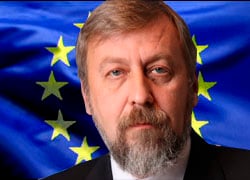
World balance will be changing, governments will be changed, influence of the states, which have been in the shadow, will be growing in the world during the crisis.
Among other things this was a forecast of participants of Brussels Forum 2009 that gathered political, economic, and intellectual elite of the world.
Our country was represented at the Forum by Andrei Sannikov, leader of the civil campaign “European Belarus”, and Iryna Krasouskaya, leader of the initiative “We Remember”. We are speaking with Andrei Sannikov about Brussels Forum:
– What singles out the Brussels Forum 2009 from other events of this kind?
– This Forum was unique because in fact it became a part of the world’s anti-crisis effort. The leading politicians and analysts were discussing possibilities for joint trans-Atlantic settling of the world burning problems.
The format of the Forum implies an interactive discussion with the audience. It is organized in such a way so as to make maximum use of the potential of its participants, that’s why there are morning discussions and discussions that last long after midnight. A part of sessions are open, but many of them are held according to the Chatham House rule, preserving confidentiality of the source of information received at a meeting. It is made for a discussion to be maximally free.
– There were so many top officials at the Forum. Do they follow general rules?
– Yes, the rule of free discussion applies for everyone. I saw many presidents and ministers strongly criticised, when their views were being challenged. These officials, however, didn’t hide behind their positions and didn’t search for words.
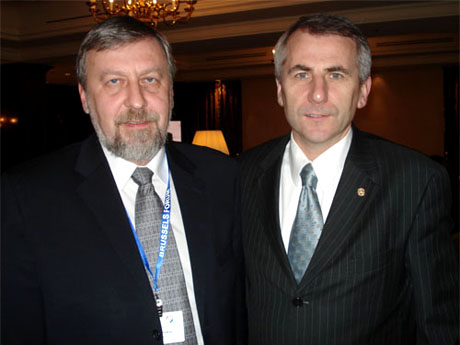
Andrei Sannikov and Lithuanian Foreign Minister Vygaudas Ušackas
– What issues are of great concern for the world’s leaders?
– A key issue at Brussels Forum was the global financial and economic crisis. Most participants touched this matter, moreover the EU anti-crisis summit ended on the day when the Forum opened. European Commission President José Manuel Barroso opened the Forum and shared his estimation of the summit. It was clear that the European Union was actively looking for ways out of the crisis not only in the EU member states, it also demonstrated a global approach. 50bn euro aid to the non-EU states proves it.
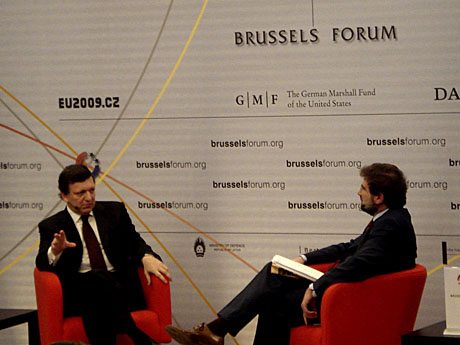
European Commission President José Manuel Barroso
World Bank President Robert Zoellick, for example, made more disappointing forecasts of the world economic development than the International Monetary Fund. It sounded like a call not to wait for a miracle but, basing on the worst, look for the most effective ways of coping with the crisis.
In couple of weeks, NATO member states will gather for their summit dedicated to the 60th anniversary of the organization, so NATO theme, further transformations of the Alliance was also actively discussed at the Forum. The democratic world faces new challenges, above all energy security, and NATO will have to find its role on these issues.
– Are there any concrete conclusions of the Forum?
– There is no final communiqué. The Forum objective is a comprehensive and detailed discussion of the global issues ahead of important international events.
The prognosis is that world balance will be changing, governments will be changed, influence of the states that have been in the shadow will be growing in the world in the crisis.
– This year Belarus drew much attention at Brussels Forum for the first time...
– A whole session was dedicated to Belarus for the first time. Lithuanian Foreign Minister Vygaudas Ušackas and I took part in this discussion. The Belarusian session was attended by Latvia’s President Valdis Zalters, OSCE Secretary General Marc Perrin de Brichambaut, leader of the Belarusian initiative “We Remember” Iryna Krasouskaya, representatives of foreign ministries of the EU states, officials and members of the European Parliament.
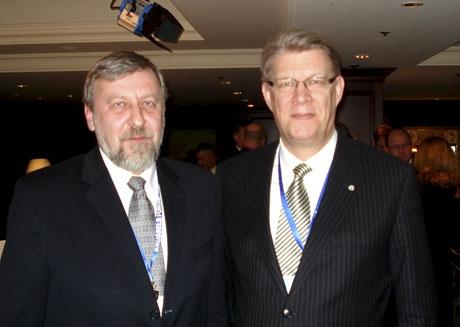
Andrei Sannikov and Latvia’s President Valdis Zatlers
The situation in Belarus is of great concern. Some changes have been noticed in the relations between Brussels and Minsk during the last months. The European Union opens more and more channels not only for communication, but also for cooperation. The same cannot be said about the Belarusian authorities. We all know well that the regime continues to use the same methods to control the situation: repressive ones. It concerns not only the opposition, but also entrepreneurs, managers at state-run enterprises, public figures, leaders of independent trade unions. So, it can be said that Europe has great expectations and hopes for changing of the situation in Belarus, but the practical steps, made by some European officials, are not always appropriate for the situation and lead to opposite results.
In general, there is an impression that European politicians have their own approaches to Belarus, European officials – different ones, and politicians of individual countries –their own ideas, and these approaches not necessarily match. Some sincerely want to help Belarus, some want to use Belarus in fighting against Russia, some do not care about Belarus and want just to keep their posts. Those who support a dialogue with Lukashenka’s regime don’t have an answer to one question: “How is it possible not to notice political repressions in Belarus?”
– Why was none of the Belarusian officials invited to Brussels?
– Perhaps, it is because Belarusian officials got used to take part in meetings on agricultural campaigns and are not ready for free discussion. But I don’t exclude that if the Belarusian authorities demonstrate that their intentions to democratize the country are serious, they may be invited for the next forum.
– Was Belarus participation in the Eastern Partnership program discussed at the Forum?
– The decision, taken in relation to the Eastern Partnership, can be called intermediate, because the program and its participants are being discussed now. It is discussed by the EU member states and potential participants. Belarus evokes more and more questions. Its participation in the Eastern Partnership will be senseless without implementation of political and economic reforms. By the way, Javier Solana in his conversation with Sergei Lavrov, speaking about Russia stated that the EU policy was based on three fundamental principles: security, economy, and respect of human rights.
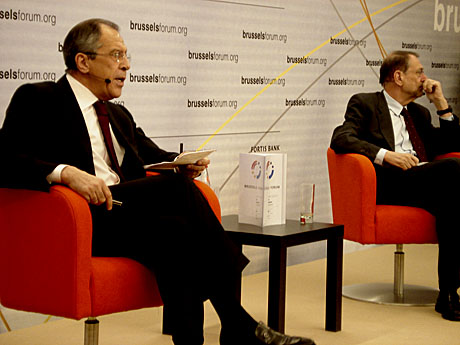
EU High Representative Javier Solana and Russian Foreign Minister Sergei Lavrov
– Was possibility of invitation of Lukashenka for the EU summit in Prague discussed?
– It was discussed, of course. It’s possible to say that many people would not like to see him in Prague.
– What meetings did you have in Brussels?
– I had talks with European and American politicians, public figures, MPs of Lithuania, Hungary, and Germany. We discussed the situation in Belarus with Latvia’s president Valdis Zatlers, who, by the way, pays much attention to the Belarusian minority in Latvia and helps Belarusians living there. I met with Czech Vice Premier Alexander Vondra, who admitted that the Czech Republic as the EU President found itself in a difficult situation in connection with Belarus’s participation in the Eastern Partnership. We had a meaningful conversation with MEP Elmar Brok and Swedish MP Urban Ahlin, who does Belarus for quite a long time.
Iryna Krasouskaya and I met with Senator John McCain, former US presidential candidate. He is interested in the situation in Belarus, supports efforts of the democratic forces. The senator sent his wishes to former political prisoner Mikhail Marynich, in whose fate he took active part, and assured us that position of the United States towards Belarus didn’t depend on a party in power.
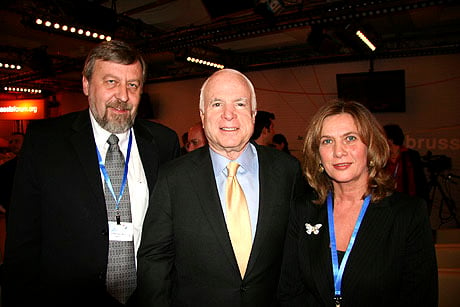
Andrei Sannikov, Iryna Krasouskaya, and Senator John McCain
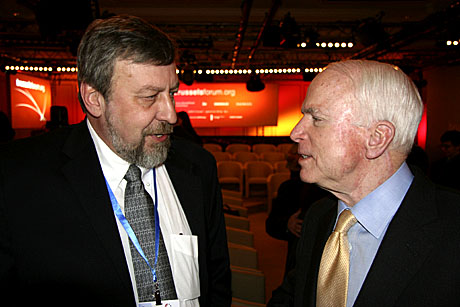
Andrei Sannikov and Senator John McCain
A meeting at the airport with a western businessman, working in Belarus became a “tuning fork” of Brussels Forum for me. We spoke about the crisis, and he suddenly told me that crisis was the best time for him, because he was a crisis manager. He can use his skills and work in the most effective way. I asked him what Belarus could expect from the crisis. He said the consequences would be very serious. But if to deal with the situation in the country from the point of view of a crisis manager, this is the best time for fundamental reforms, both political and economic. In his view, the current political system of Belarus won’t allow finding a way out of this hard economic situation. But if there are decisive changes in power, Belarus will not only overcome the difficulties but will become one of the leaders in Eastern Europe.
Note of the Charter’97 press center:
Brussels Forum is an annual high-level meeting of the most influential North American and European political and intellectual leaders, organized by the German Marshall Fund of the United States.
More than 200 people took part in the Forum 2009. Among them were President of the European Commission Jose Manuel Barroso, NATO Secretary General Jaap de Hoop Scheffer, OSCE Secretary General Marc Perrin de Brichambaut, former presidential candidate US senator John McCain, EU High Representative for the Common Foreign and Security Policy Javier Solana, World Bank President Robert Zoellick, Latvian President Valdis Zatlers, President of Georgia Mikheil Saakashvili, Belgian Prime Minister Herman Van Rompuy, White House Counsel Gregory Craig, Swedish Minister of Foreign Affairs Carl Bildt, Foreign Minister of Russia Sergei Lavrov, Czech Prime Minister Mirek Topolanek, Vice Premier of the Czech Republic Alexander Vondra, Ukrainian Vice Premier Grigory Nemirya, Minister of Foreign Affairs of the Czech Republic Karel Schwarzenberg, Minister of Foreign Affairs of Lithuania Vygaudas Usackas, Foreign Minister of Slovakia Miroslav Lajčák, Foreign Minister of Poland Radoslaw Sikorski, Minister of Defence of Belgium Pieter De Crem, US senators Robert Casey, Robert Bennett, George Voinovich, Mel Martinez, James Risch, congressman Alcee Hastings, congresswoman Ellen Tauscher, President of the Senate of Romania Mircea Geoană, Special US Envoy to Pakistan and Afghanistan Richard Hallbrook, and other international leaders.










